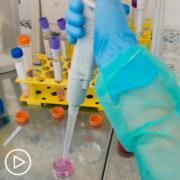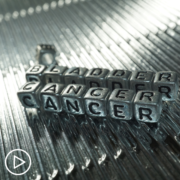Expert Update: Bladder Cancer Treatment & Research News
Expert Update: Bladder Cancer Treatment & Research News from Patient Empowerment Network on Vimeo.
Dr. Fern Anari reviews highlights from the ASCO 2022 meeting and shares her expert perspective on the future of bladder cancer treatment.
Dr. Fern M. Anari is a genitourinary medical oncologist and assistant professor in the department of hematology/oncology at Fox Chase Cancer Center. Learn more about Dr. Anari, here.
See More From The Pro-Active Bladder Cancer Patient Toolkit
Related Programs:

|

|

|
Transcript:
Katherine Banwell:
Dr. Anari, cancer researchers recently came together for the 2022 ASCO meeting. Were there any highlights from that meeting that bladder cancer patients should know about?
Dr. Anari:
Yes. So, our annual meetings are always a really exciting time to learn about and share the results of really cutting-edge research that’s been going on. And this year at ASCO 2022, I think there were several standout studies for various stages of bladder cancer.
So, in patients with localized bladder cancer, again, similarly to what we discussed with immunotherapy and what we call BCG unresponsive bladder cancer, they looked at combining BCG with another new drug. And what they found is that the cancer shrunk down completely in over two-thirds of cases.
And those responses tend to last over two years of follow-up. The drug was shown to be safe and tolerable. So, I think that’s a really exciting potential future treatment for people. There was another study that looked at a targeted treatment called enfortumab vedotin, which is typically used in the metastatic setting after someone’s received chemotherapy and/or immunotherapy. They looked at using that before surgery in localized muscle-invasive bladder cancer.
The reason it’s important to look at drugs like this is because the standard of care right now is to give cisplatin-based chemotherapy before surgery to remove the bladder.
But not everyone is eligible to get that cisplatin drug for various reasons. So, the current standard of care is to just go straight to surgery. But we know that by giving some form of a chemotherapy before, that helps increase cure rates.
And what they actually found in this study looking at enfortumab vedotin is that they were able to shrink down cancer completely, meaning at the time of surgery there was no cancer left in the bladder 36% of the time, which is actually on par with our standard of care treatment that we use today.
So, I think this also shows a lot of promise in patients who historically would need to go straight to surgery without any preoperative treatment. And then, lastly, HER2 is a type of targeted therapy as well that’s most commonly known in the breast cancer treatment world. But it’s also been looked at in bladder cancer.
And there’s a new drug that’s being studied that really strongly targets HER2, which is expressed on some bladder cancer cells. So, they’re looking at this new drug in combination with immunotherapy, which is already approved in bladder cancer. And, again, I think this is another really promising combination for patients who’ve already received other treatments for their bladder cancer.
Katherine Banwell:
It sounds like a lot of progress is being made in the field. What are you excited about when it comes to bladder cancer research?
Dr. Anari:
I think what excites me the most is being able to offer patients both the standard treatment options where, really, the clinical trials of yesterday are our standard treatments today. So, I’m excited to be able to offer them the standard treatment but also give them the background of why that’s approved and why we use it but also give them the hope that we have these really promising drugs.
And, luckily, at our cancer center, we have access to a lot of these before they’re approved by the FDA. So, it’s really exciting to be able to offer this cutting-edge research in the form of treatments to our patients.







